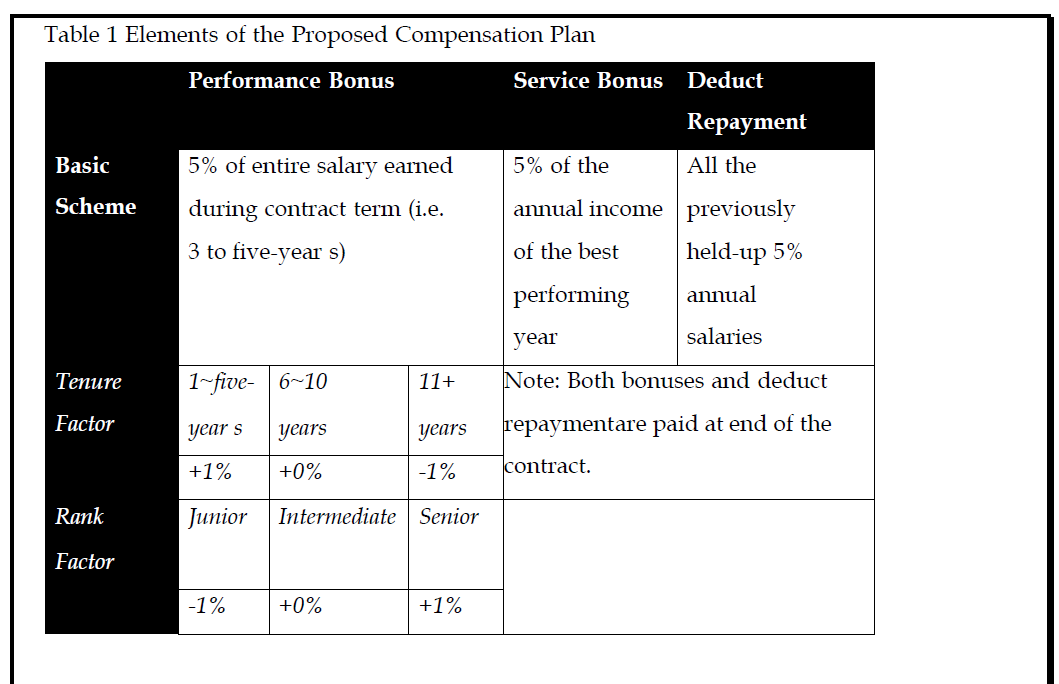Question
Unintended consequences of a Well-intended Pay Policy University of Business (UoB), a leading private business university, had to revamp its compensation policy to forestall the
Unintended consequences of a Well-intended Pay Policy University of Business (UoB), a leading private business university, had to revamp its compensation policy to forestall the rising dysfunctional turnover of lecturers. This year management observed a relatively high turnover rate among teaching staff compared to similar private universities (e.g., 40 of 900 teaching staff resigned) and two Deans left the university. After the several months work by a consulting company and the universitys human resources team, a new policy was drafted which included performance-linked bonuses deemed highly favorable to the universitys lecturers. The consulting team performed a series of formal interviews with Lecturers and administrative employees to gain a better insight to the situation. At the end of the two-month period, they provided a detailed report proposing change to the current compensation plan to combat turnover. The consultants suggested that performance-based pay scheme with generous bonuses be introduced and that all administrative staff should sign a new contract with the university. This is because, per the consultants findings, most employees were worried about the career prospect at this university, since their salaries have not changed in the past 4 years, and there was little sign of promotion. It was also brought to the notice of the consultants that the HR department had been having a hard time recruiting new teaching faculty for many years, which might be attributed to the fact that the HR department was obliged, under current pay policy, to minimize the cost when recruiting new staff in each recruitment category. To address these issues, the HR department was recommended to invest over Gh10,000,000 Ghana cedis to finance overall payment raise for all full-time lecturers in a bid to provide a salary package well above the market average. What is noticeable is that the policy entails a sophisticated bonus plan, which involves three criteria, i.e. tenure at the university, rank of position, and the amount of administrative service one performs, as indicated in Table 1. Specifically, during each academic year, each Lecturer is paid, at first, 5% less of their annual salary. However, at the end of each contract period (typically ranging from 3 to five-years) they will receive the previously deducted 5% of their salary, in addition to bonuses. Typically, the first bonus will be worth a certain percentage of the employees entire salary during the contract period, provided that his or her performance (teaching, research and/or service) is not below the average university average. The percentage in question is 4 for intermediate Lecturers with tenure of less than five-year s, 5 for Lecturers having worked at the university for 6-10 years, and 3 for longer than 11 years. The figure is 1 percent lower for junior Lecturers and 1 percent higher for senior Lecturers. On top of these, each Lecturer with extra service responsibilities will receive an extra bonus worth of 5% of their highest earning annual income multiplying the number of years they work. For example, Mr. Antwi is a Senior Lecturer (i.e., high in rank) on a five-year contract. He has worked in the university for 2 years, and he is serving currently as the chair of the Teaching Excellence Committee (i.e., extra service responsibility). If he signs a new five-year contract, then, per his new pay scheme, he is going to have 5% of his income held up (which is to be returned at the end of his five-year contract, if he did not quit the job). If he continues to perform satisfactorily as he has so far,
he is expected to receive extra 6% of the entire income he made during the five-year s, and 5 times 5% of his income for 2021, which is the year of his highest annual income. In total, his end-of-five-year -contract bonuses could be around 55% of his annual income. Consider another example. Ms. Yandago, an intermediate Lecturer without any administrative responsibilities, has already worked at the university for 12 years (at the end of her fourth three-year contract). Under the new compensation plan, if she renews her contract and continues to perform satisfactorily, she is expected to receive extra 4% of the entire income she made during the three years, plus 3 times 5% of her income for 2021, which is her best evaluated performing year. The previously deducted 5% of her annual income will also be paid back. At the end of Ms. Yandagos new three-year contract, she can expect a bonus worth roughly 27% of her annual income. According to the design, this new compensation plan should mitigate the universitys current turnover issue and enhance employees morale, with bonus and deduction elements clearly incentivizing Lecturers to sign a longer-term contract, stay until the end of the contract, assume more service responsibilities, and strive to perform better. To avoid unnecessary confusion, during the process of plan making, most Lecturers were deliberately kept in the dark. The university hoped to organize briefing sessions when the policy was ready to be implemented. However, there were soon rumors about the pay scheme change. some months before the policy took actual effect, the proposed new policy had already begun causing problems. Contrary to expectations that the new policy will improve employees motivation to stay, the staff suffered from low morale, with many lecturers calling in sick, showing up late for lectures, taking annual leaves in the middle of a semester, and postponing service tasks. Many Lecturers, without knowing the details of the new compensation plan, thought that they would be forced to work under stricter supervision and that they will be penalized if their performance falls short of the new requirement. Questions abound as to how they will be evaluated. Some Lecturers worried that the university may prompt them to do more research. In Ghana, publishing in SCI or SSCI-indexed journals is becoming the new norm at major public universities, and individuals working at private universities, at least Lecturers, had previously not been required to publish much research. One junior Lecturer at the universitys design school expressed her concern, to get a payment raise in our school, it will from now on depend on the number of papers you publish. For those who major in design, there are not many journals. Besides, it can be very expensive to publish in one. We are already at a disadvantage. What if they required more? Another Lecturer voiced a similar concern: If we are required to publish more papers, considering the money and time it might cost us, the bonuses we will receive, at least most of them, will be used to cover our research cost. At the end of the day, the university gains academic reputation, and we get nothing. Rapidly sensing the mounting pressures from the Lecturers, the university top management began to be more open about the policy change and communicate to the Lecturers during a university level faculty meeting that the new compensation plans introduction was to entice talented employees to stay and work for long term. However, such disclosure of information did not appease the Lecturers.
Mr. Banda, a Senior Lecturer from the economics department, felt there must have been some confidential information that was not disclosed, I feel that I am being betrayed. The management clearly doesn't trust us. If they really want to raise our pay, why did they keep it a secret at the beginning? In the defense of the new compensation plan, however, some senior managers stressed that generous bonuses were involved, and the top recipients would receive a large amount of money, one third more than what he or she would make in one year. And this would show that the university really valued the employees. The introduction of the new plan prompted some Lecturers to quit their job or to further dissociate themselves from their job. For example, Mr. Laweh, a Lecturer from the universitys Architecture school, remarked that he had been hoping for a payment raise almost every year, but now decided to start his own business, and would only teach on a part-time basis. While many employees opted to sign new contract under the new policy, many more employees voiced their discontent and wanted to stay on their old contract, despite that they now had all the information and were clear about the bonuses schemes. Low morale was easy to observe among many Lecturers, and even among Lecturers who accepted the new policy, some were discussing new ways to retaliate. One upset Lecturer expressed that, I will give some of my students a hard time if they do not behave. You know, more work, more reading, stricter marks, which are what we should have done all along. And when I invigilate exams, you know how I love to catch cheating students. Another Lecturer mentioned, Because they (the school) have paid me to do this. Lets make my tedious work a bit more fun. The top management was baffled and wondered what could have gone wrong?
a. Discuss the likely reasons for decreasing employee morale and the rise of turnover?
b. Critically analyze the facts of the case and explain which aspects of organizational justice perceptions are causing the low moral
c. Apply 2 motivation theories to explain the reaction of lectures to the new policy?
d. What do you think could be done, if anything, to encourage acceptability of the new compensation plan?

Table 1 Elements of the Proposed Compensation Plan Performance Bonus Service Bonus Deduct Repayment Basic 5% of entire salary earned 5% of the All the Scheme during contract term (i.e. 3 to five-year s) annual income previously of the best held-up 5% performing annual year salaries Tenure 1-five- 6-10 11+ Note: Both bonuses and deduct Factor years years years repaymentare paid at end of the +1% +0% -1% contract. Rank Junior Intermediate Senior Factor -1% +0% +1% Table 1 Elements of the Proposed Compensation Plan Performance Bonus Service Bonus Deduct Repayment Basic 5% of entire salary earned 5% of the All the Scheme during contract term (i.e. 3 to five-year s) annual income previously of the best held-up 5% performing annual year salaries Tenure 1-five- 6-10 11+ Note: Both bonuses and deduct Factor years years years repaymentare paid at end of the +1% +0% -1% contract. Rank Junior Intermediate Senior Factor -1% +0% +1%
Step by Step Solution
There are 3 Steps involved in it
Step: 1

Get Instant Access to Expert-Tailored Solutions
See step-by-step solutions with expert insights and AI powered tools for academic success
Step: 2

Step: 3

Ace Your Homework with AI
Get the answers you need in no time with our AI-driven, step-by-step assistance
Get Started


